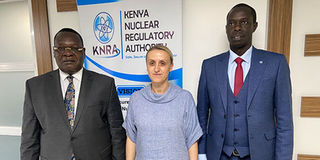Premium
Kenya to broker more collaborations on nuclear energy

Kenya Nuclear Regulatory Authority (KNRA) chairman Omondi Anyanga (left) Slovakia’s Ambassador to Kenya Katarina Leligdonova and KNRA Director General James Keter in Nairobi on December 21,2023.
Kenya is seeking to collaborate with Slovakia on its nascent nuclear programme, which is expected to pave the way for its first nuclear power plant in 2035.
Slovakia is one of Europe's nuclear powerhouses, with at least five nuclear reactors generating half of its electricity.
On Thursday, Slovakia's Ambassador to Kenya, Katarina Leligdonova, met senior officials from the Kenya Nuclear Regulatory Authority (KNRA) in Nairobi, who said workforce development would be key to the country's nuclear debut.
The KNRA team, led by Director General James Keter, said Kenya was seeking resources, the latest technologies and best practices to fully tap into nuclear energy. "The journey has begun and we remain open-minded," Mr Keter said.
Ms Leligdonova said her country was ready to cooperate with Kenya, starting with offering expertise and organising strategic learning exchanges.
"For us, nuclear energy is important and there are lessons to be learned. We have reactors in decommissioning, running and construction... We can have a Memorandum of Understanding (MoU) on knowledge exchange as we look forward to a major visit by a Slovak delegation in February," she said.
The envoy said having nuclear power as an energy source alongside renewables would further help Kenya reduce its carbon footprint.
"In Slovakia, we are now looking at a new generation of reactors and we are cooperating with the US. We want Small Modular Reactors (SMRs) linked to industries to go green," she told the meeting.
Kenya's total installed energy capacity is 863 MW geothermal, 838 MW hydro, 436 MW wind, 2 MW biomass, 173 MW solar and 678 MW thermal.
KNRA chairman Omondi Anyanga said Kenya's successful nuclear debut would depend largely on funding, proper regulatory controls and human resource development. "Collaboration is the catchword that will make us successful," he said, adding: "We look forward to productive engagements on many fronts."
Mr Anyanga said the KNRA would work closely with international partners, research institutions, academic institutions and the Nuclear Power and Energy Agency to adequately prepare for what he called Kenya's nuclear take-off towards energy sufficiency and peaceful use of nuclear power.
KNRA Director of Licensing Shadrack Kiti said the need for robust regulation in the nuclear and radiation sectors remains at an all-time high.
"Illicit trade in nuclear and other radiation materials as well as theft, sabotage and malicious acts require us to expand our mandate," Mr Kiti said.
He added that consultations were underway for Kenya to accede to treaties such as the convention on nuclear safety, the convention on early notification of nuclear accidents, the convention on assistance in the case of nuclear accidents and radiological emergencies and the 1997 joint convention on the safety of spent fuel management and the safety of radioactive waste management.
"In our regulatory development journey, KNRA is seeking financial support on viable financing options for the development of regulations as such a process is capital intensive," Mr Kiti said.
Thursday's meeting came a month after the KNRA held talks with nuclear experts from South Korea with a view to enhancing cooperation. The authority has a memorandum of understanding with the US Nuclear Regulatory Commission and is in talks with US-based Excel Corporation, among others.

